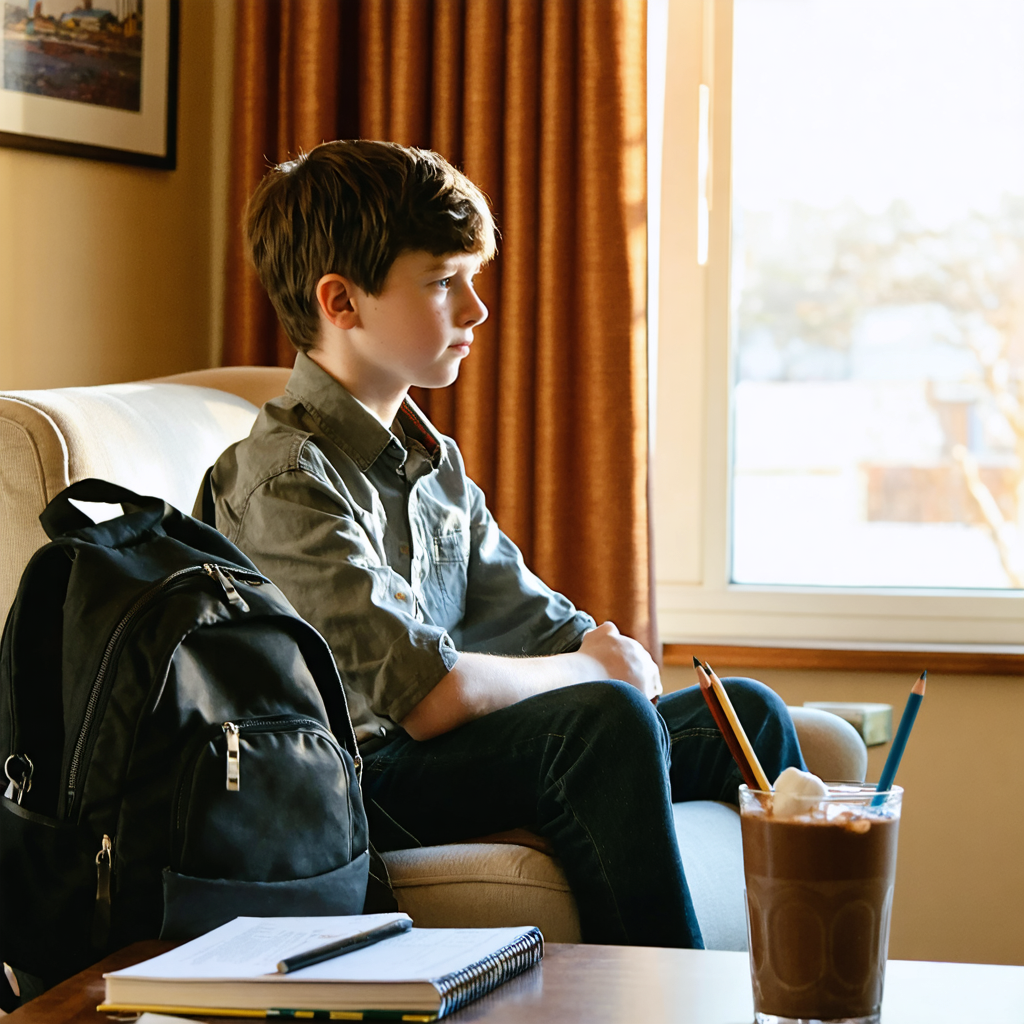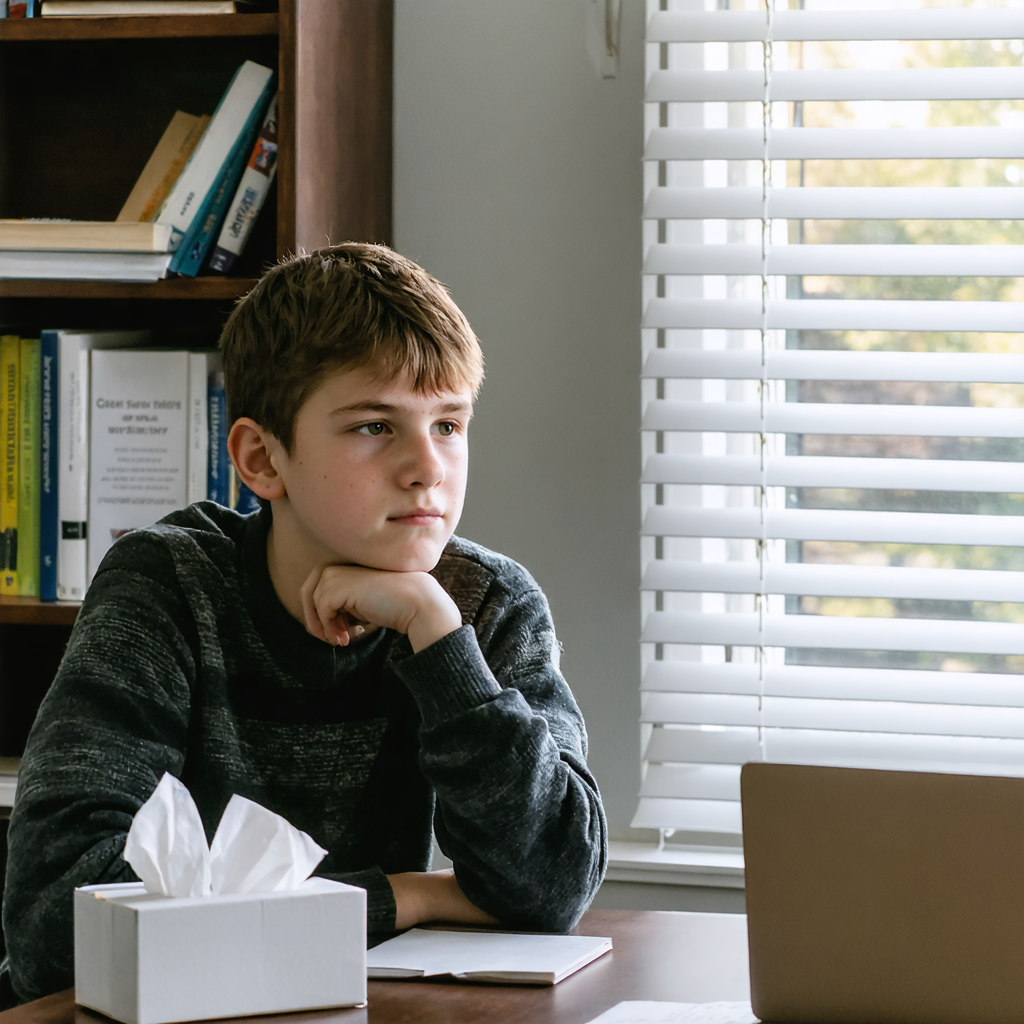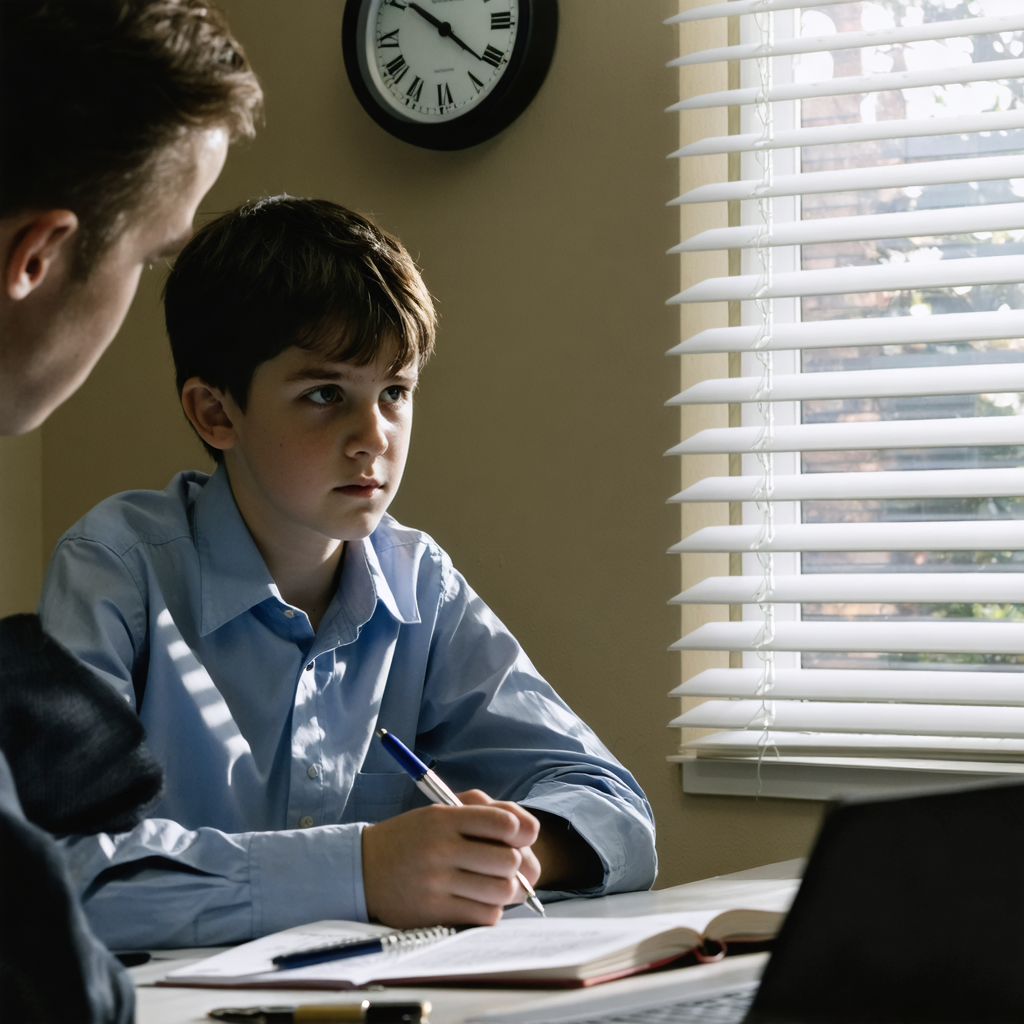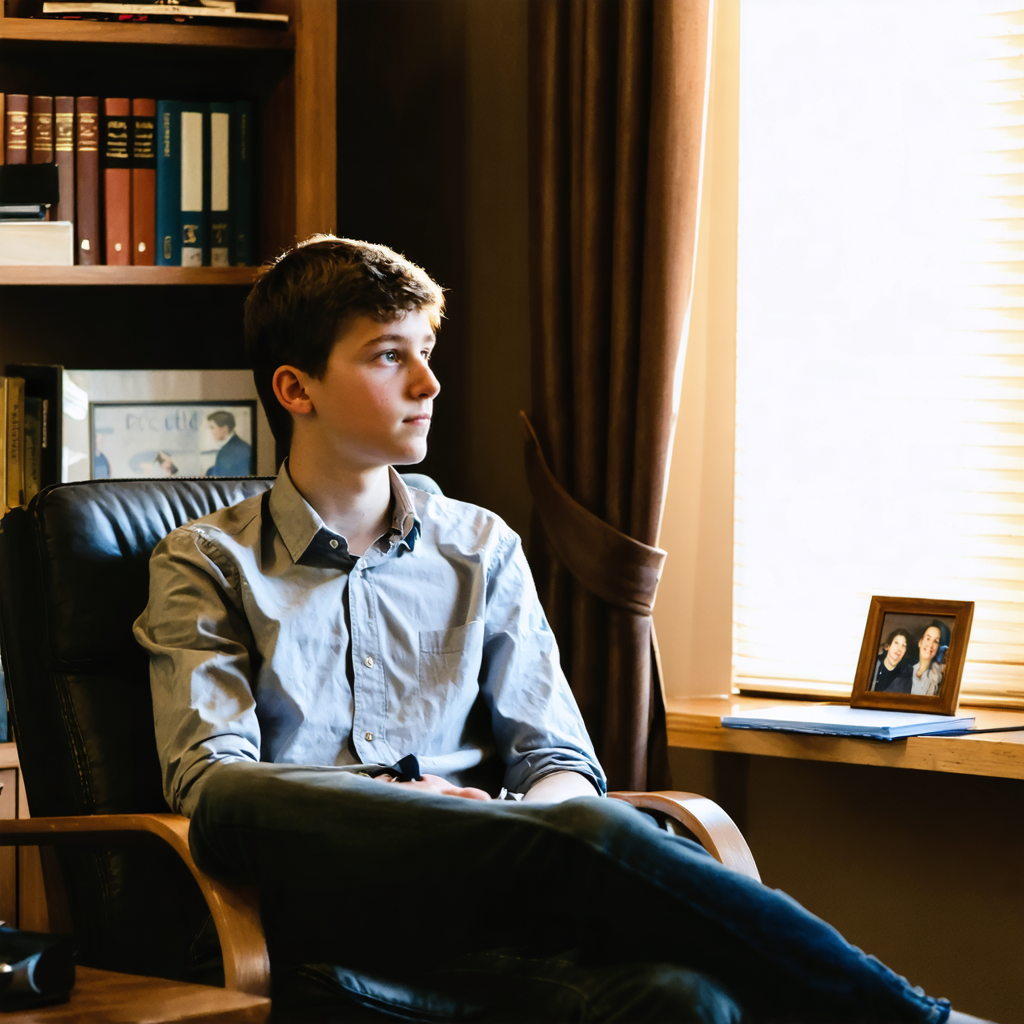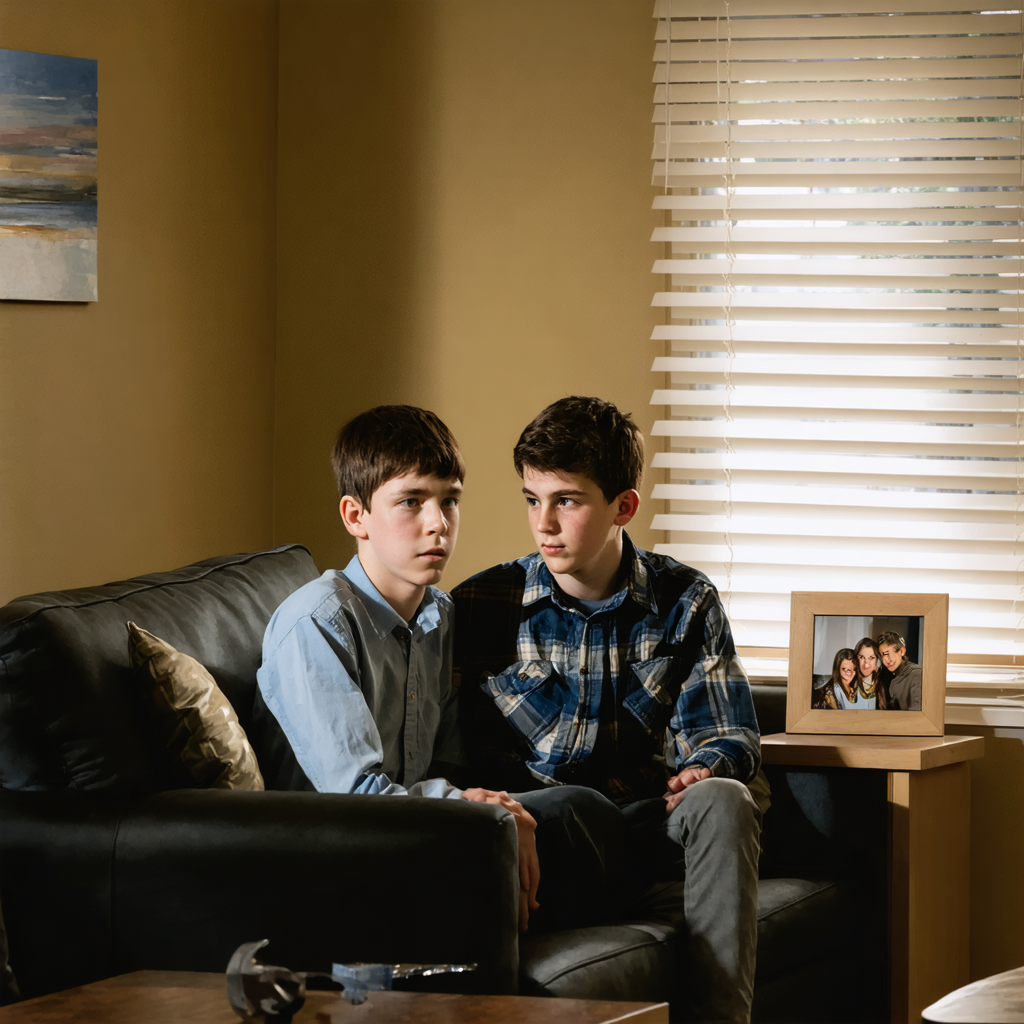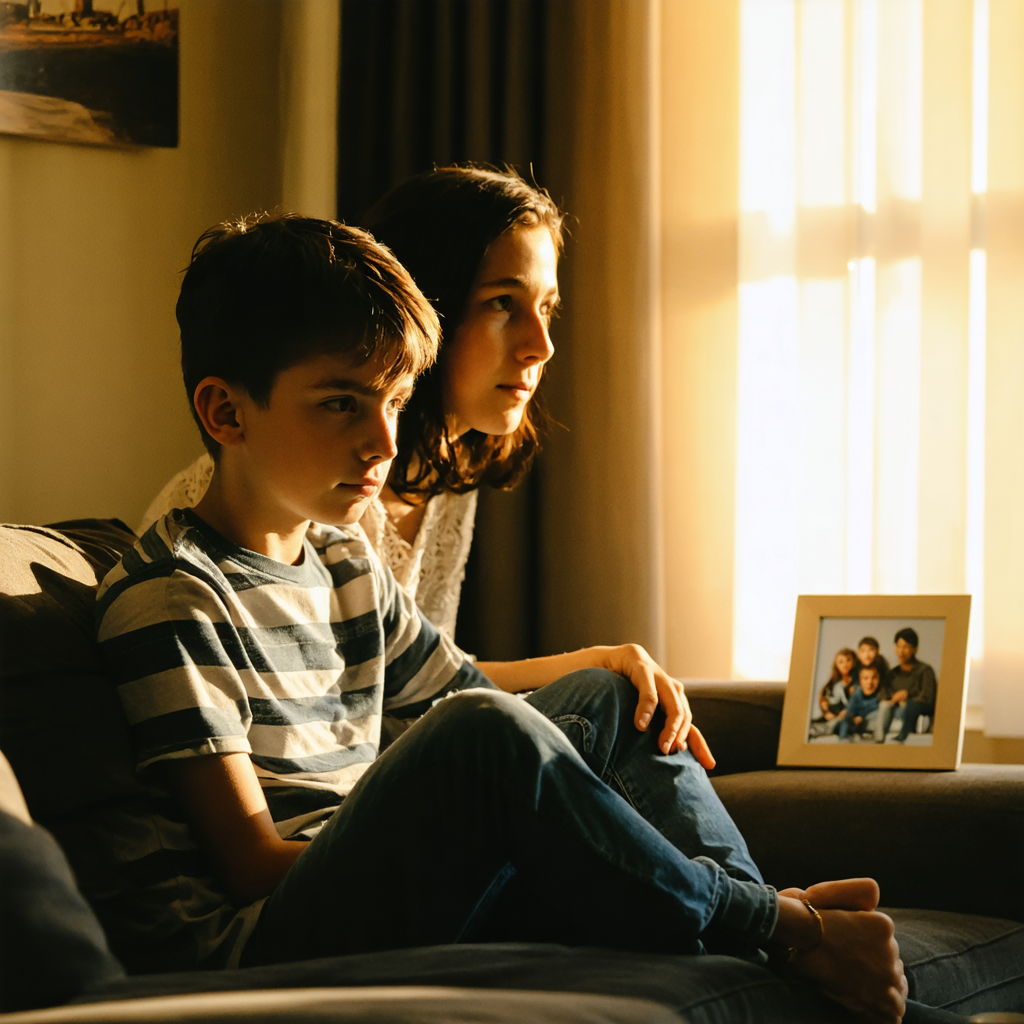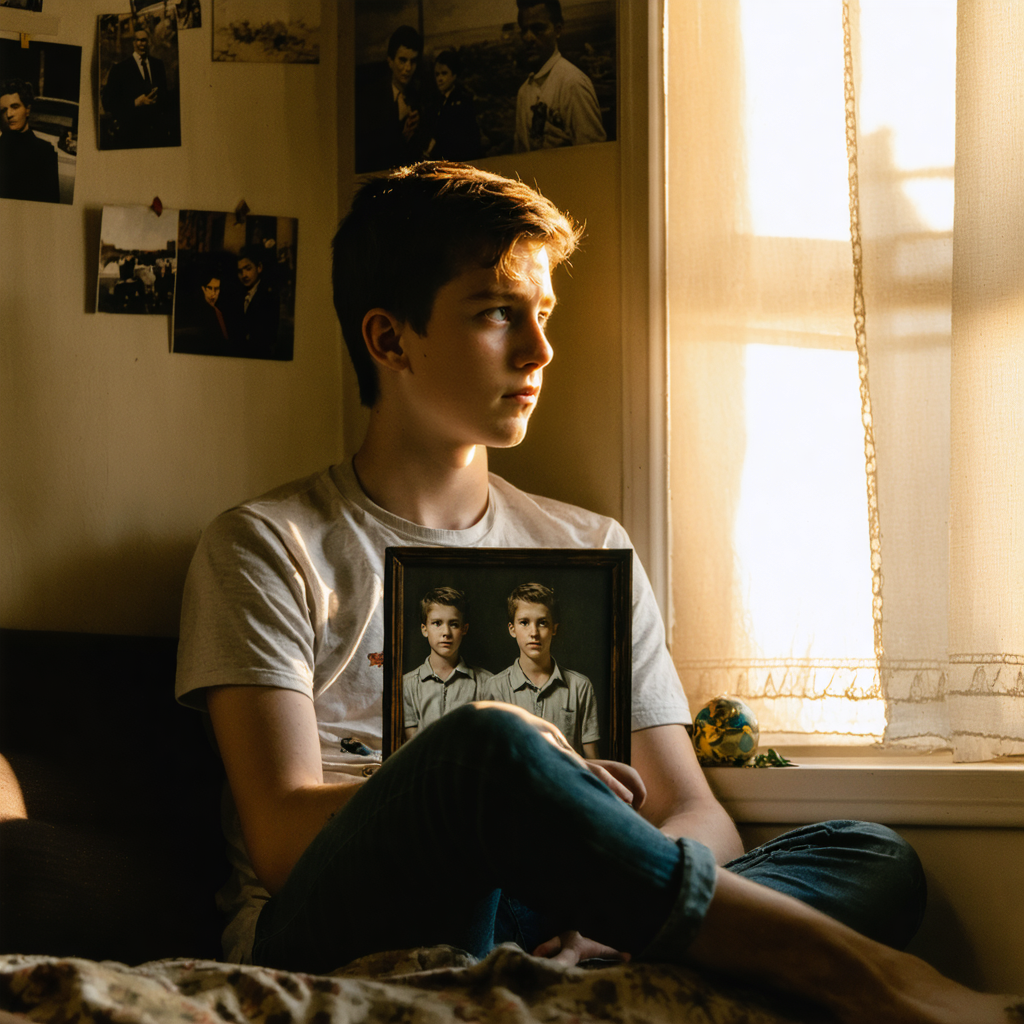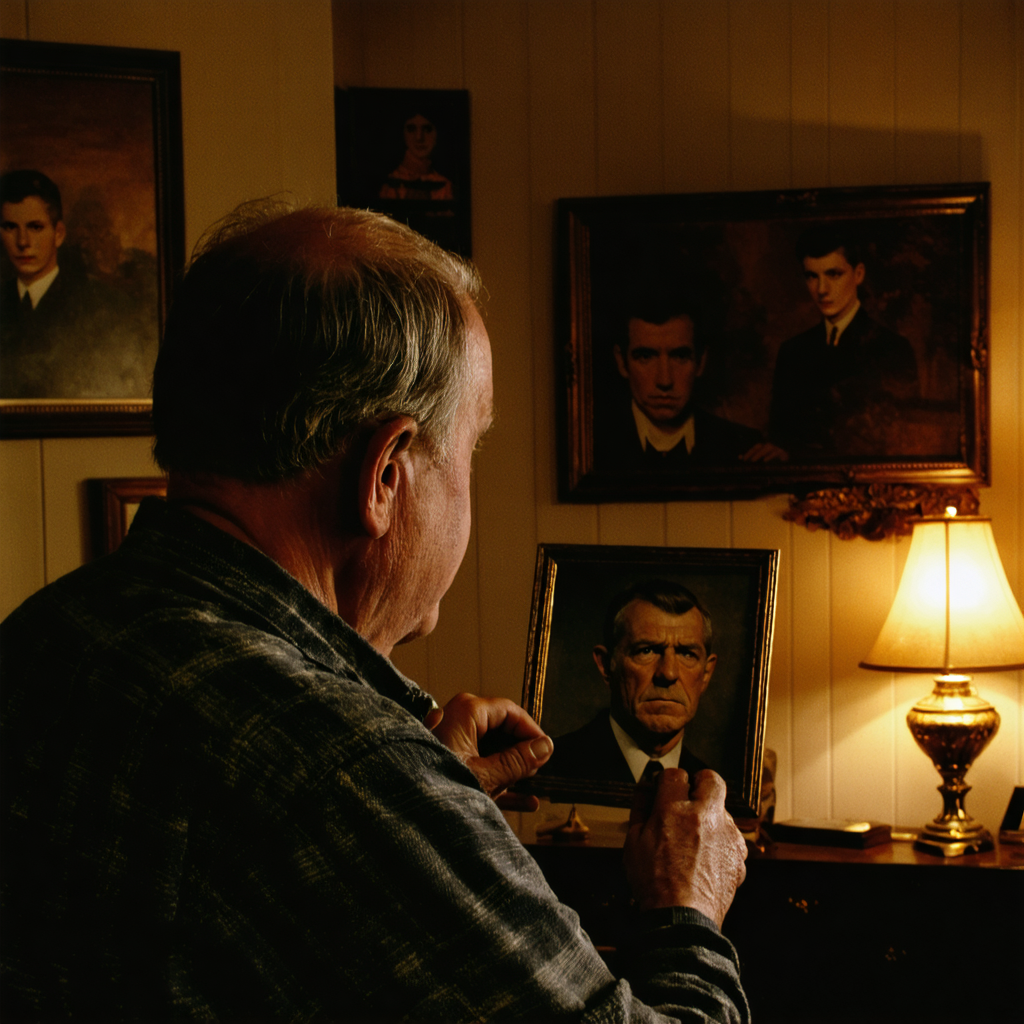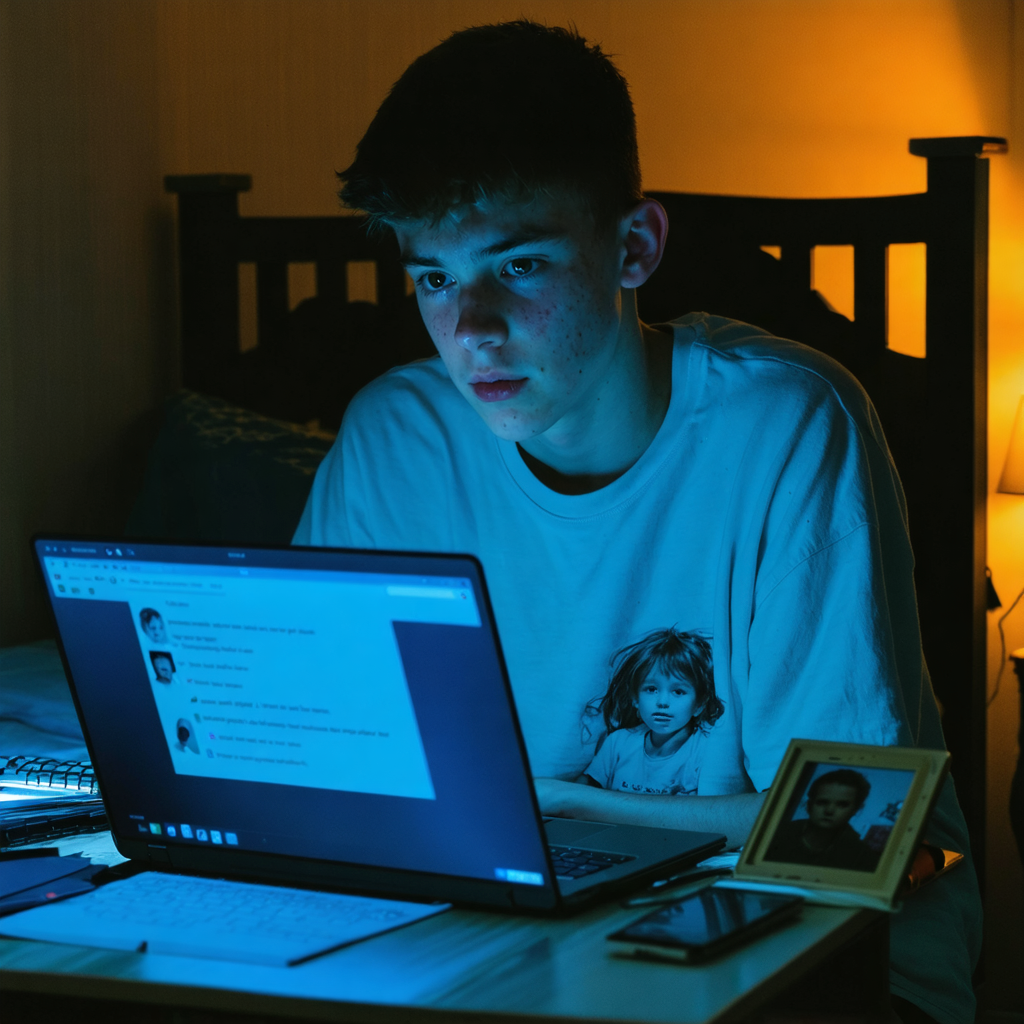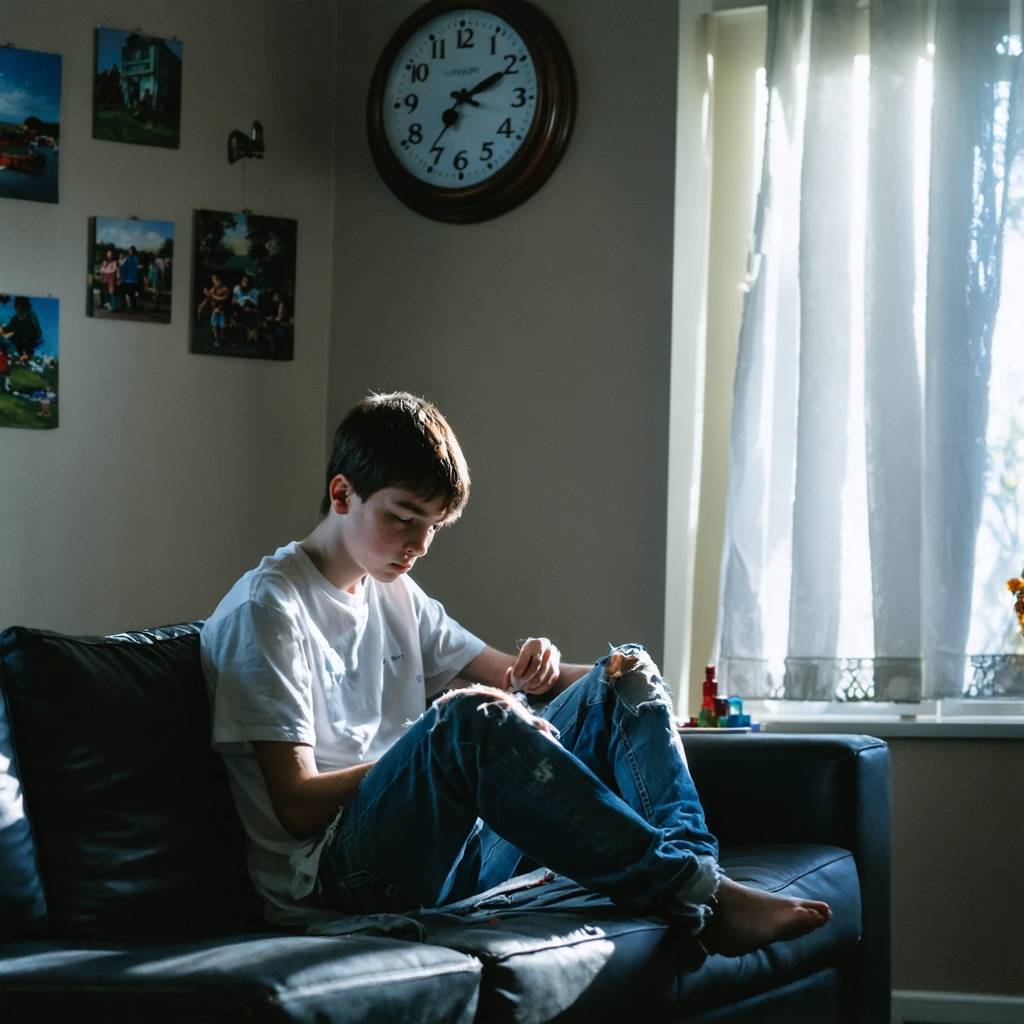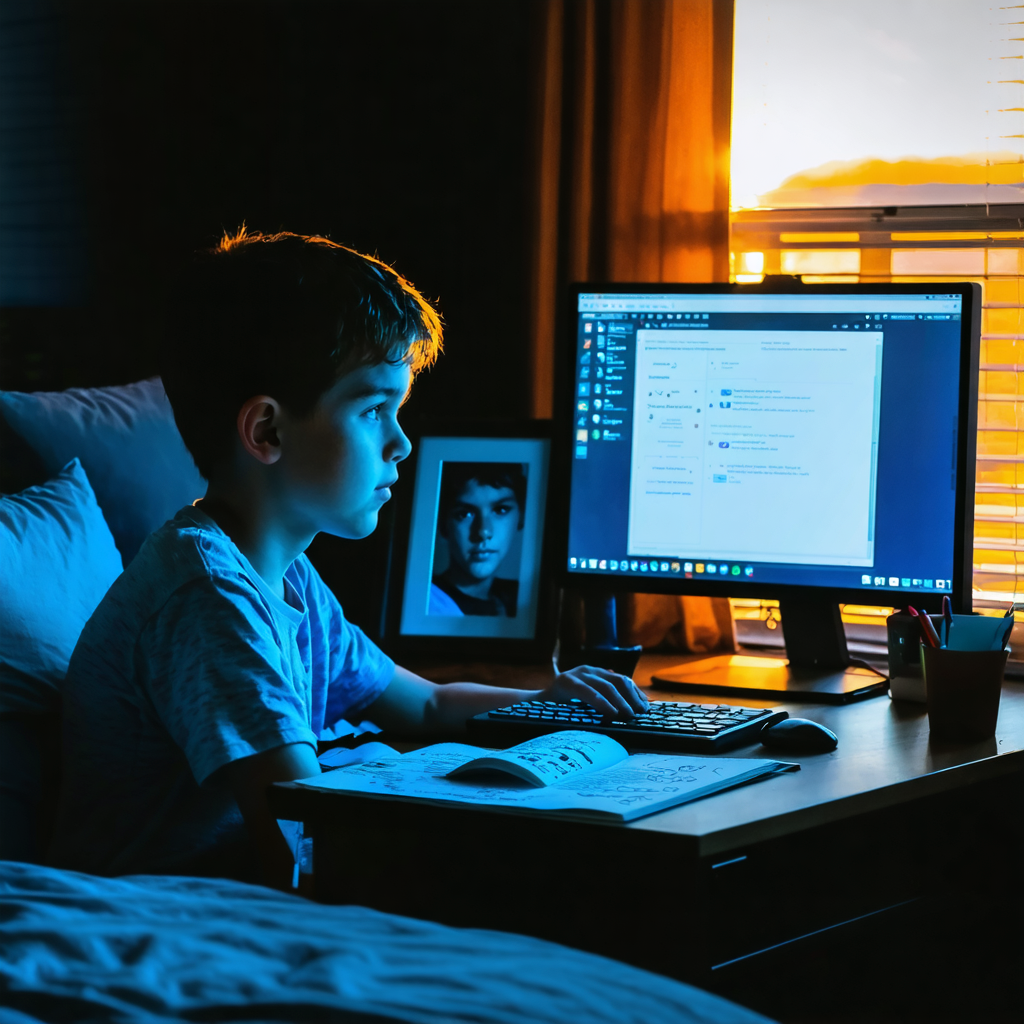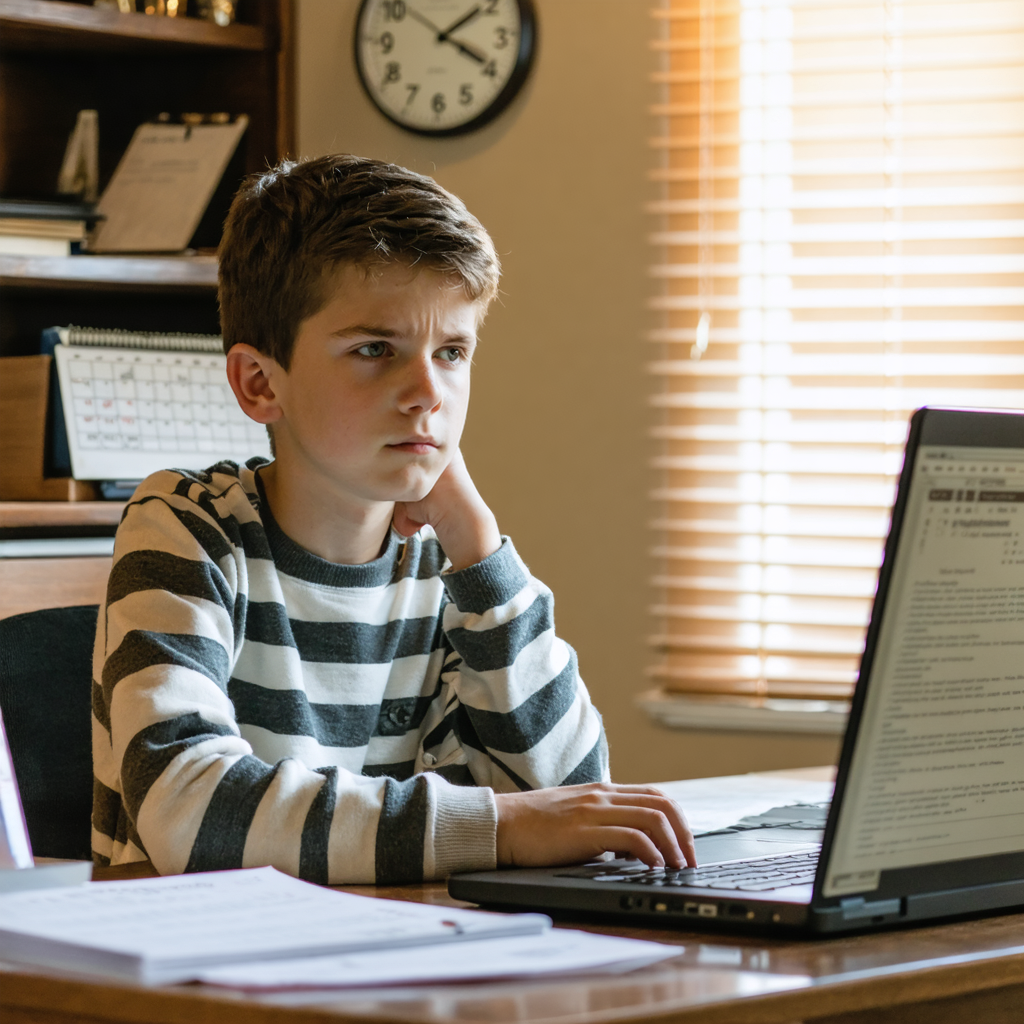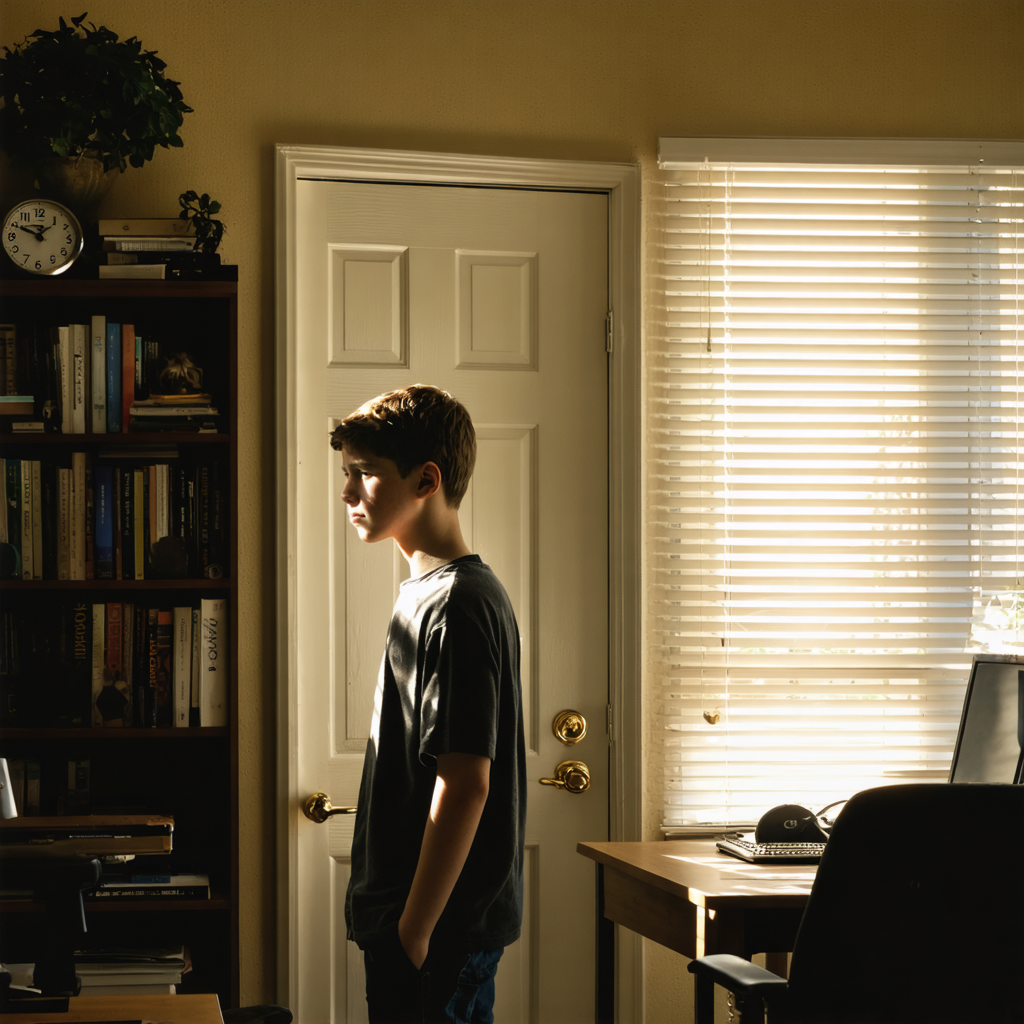The Shocking Truth: How a 14-Year-Old Discovered His Father Was Someone Else Entirely
The Quiet Office Where Secrets Unfold
My office has always been a sanctuary for troubled teens. The soft blue walls, comfortable chairs, and the gentle hum of the white noise machine create an environment where kids feel safe enough to share their deepest fears. As a mental health counselor specializing in adolescents and young adults aged 13-21, I've heard countless stories that would break your heart.
But none quite like the one that unfolded with Jamie, a quiet fourteen-year-old with thoughtful eyes who had been visiting me weekly for nearly six months. There was something different about him from the start—a perceptiveness beyond his years that made our sessions particularly meaningful. Little did I know that our regular Thursday afternoon appointment would reveal a family secret that would change everything.
The Boy Who Always Arrived Early
Jamie was unlike my other patients in many ways. He always arrived precisely seven minutes early for his appointments, dressed in neatly pressed clothes that seemed at odds with typical teenage fashion. His backpack was meticulously organized—books arranged by subject, pencils sharpened to the same length.
We'd established a comfortable routine over the months: he'd settle into the oversized armchair by the window, accept a cup of hot chocolate (two marshmallows, never three), and gradually begin to unpack his week. His issues had seemed fairly standard—school pressures, social anxiety, occasional conflicts with parents—until that particular Tuesday when he walked in with his shoulders hunched and his eyes darting nervously around the room.
I could tell immediately that something fundamental had shifted in his world. The air in the room felt heavier somehow, charged with an unspoken revelation waiting to break free.
The Session That Changed Everything
"I found something out yesterday," Jamie said after fifteen minutes of unusual small talk about the weather and a science project he was working on. His voice was steady, but his fingers trembled slightly as they wrapped around his mug. I nodded encouragingly, giving him the space to continue at his own pace.
This was often how our breakthrough moments happened—not with dramatic declarations, but with quiet statements that opened doors to deeper truths. "It's about my family," he continued, his eyes fixed on the steam rising from his hot chocolate. "About who I am." The clock on my wall seemed to tick louder in the silence that followed, marking the moments before a revelation that would reshape his understanding of his entire life.
I waited, knowing that sometimes the most important thing a therapist can do is simply be present while someone finds the courage to speak their truth.
The Words That Couldn't Be Unsaid
"I'm adopted," Jamie finally said, the words hanging in the air between us like delicate glass ornaments that might shatter if touched too roughly. "I just found out yesterday." My mind immediately raced to professional protocols—how to support a child through this kind of discovery, especially one made without proper family support. Adoption itself wasn't the issue;
many children thrive in adoptive families. But the way a child discovers this truth can have profound psychological impacts. "That's significant information, Jamie.
How are you feeling about it?" I asked, keeping my voice gentle and neutral. His response wasn't what I expected. Instead of expressing confusion or hurt, he looked directly at me with those perceptive eyes and said, "I'm mostly wondering why no one ever told me.
Fourteen years is a long time to keep a secret." The maturity in his observation struck me, as did the underlying question that would soon lead us down an unexpected path.
The Question That Revealed More Than Expected
Professional curiosity and concern prompted my next question, one that seemed straightforward enough at the time. "How did you find out?" I asked, expecting perhaps that he'd discovered adoption papers, overheard a conversation, or maybe a well-meaning relative had let it slip. Jamie's answer sent a chill through me that had nothing to do with the office's air conditioning.
"The man who calls himself my father told me," he replied, his voice taking on an odd, detached quality I hadn't heard from him before. The phrasing was jarring—not "my dad" or even "my father," but "the man who calls himself my father." It suggested a sudden and complete disconnection from the parent he'd previously spoken about with typical teenage ambivalence but underlying affection. Something about the way he said it made me pause my note-taking, sensing there was much more to this story than a simple adoption revelation.
The Revelation That Left Me Speechless
"What exactly did he say to you, Jamie?" I asked, choosing my words carefully. The boy's face remained unnervingly calm as he recounted the previous evening's events. "He was drinking again.
Not falling-down drunk, but that kind where he gets really honest about things. Mom was working late." Jamie paused, taking a sip of his now-cooling chocolate. "He looked at me for a long time while I was doing homework and said, 'You know you're not really mine, right?' Just like that, like he was commenting on the weather." My heart sank at the callousness of such a delivery.
Fourteen years of identity, of family connection, casually dismantled over homework at the kitchen table. But Jamie wasn't finished, and what came next would complicate this situation beyond anything I had initially imagined. The session was quickly moving into territory I hadn't anticipated when I'd reviewed his file that morning.
The Truth About Jamie's Biological Father
"When I asked what he meant," Jamie continued, "he told me my real father is in some mental hospital hours away from here. Said he's been there since before I was born." Jamie's matter-of-fact delivery couldn't mask the tremor in his hands as he set down his mug. "He showed me a picture on his phone.
Old, from before smartphones. The man looked...a lot like me." The implications of this revelation were staggering. Not only had Jamie discovered his adoptive status in perhaps the most traumatic way possible, but he'd also been immediately confronted with information about a biological parent with serious mental health issues.
My mind raced through the potential genetic implications, the identity questions this would raise for an already vulnerable teenager, and the immediate need to establish proper support. But most concerning was what this revelation suggested about his home environment and the judgment of his adoptive father.
The Silence That Spoke Volumes
For several minutes, neither of us spoke. The weight of Jamie's revelation seemed to press the air from the room. Outside my window, life continued normally—cars passing, birds landing on the oak tree, a group of college students laughing as they walked to the campus coffee shop.
But inside, time had suspended as I considered the professional and ethical dimensions of what I'd just heard. Jamie watched me process this information, his eyes revealing a wisdom beyond his years. "You're trying to figure out if you need to report this, aren't you?" he asked quietly.
His perceptiveness startled me again. Most fourteen-year-olds wouldn't immediately grasp the mandatory reporting aspects of therapy, but Jamie had always been unusually attuned to adult concerns. I needed to understand more about the situation at home, about his adoptive mother's knowledge, about whether this revelation had been accompanied by any form of emotional or physical abuse.
The Questions That Needed Answers
"Jamie, does your mom know that your father told you this?" I asked, deliberately using the term 'father' without qualifiers to see how he would react. His shoulders tensed slightly—a tell I'd come to recognize when something touched a nerve. "I don't think so.
She came home late and went straight to bed. This morning everyone acted normal, like nothing happened." He paused, picking at a loose thread on his jeans. "I'm not even sure if she knows that I know.
Maybe this is something they never planned to tell me." The complexity of the situation was mounting. If his adoptive mother was unaware of both the adoption revelation and the manner in which it had been delivered, we were potentially dealing with a fractured family system where communication had broken down in dangerous ways. I needed to understand more about the dynamics at play and whether Jamie was at risk in his current environment.
The Biological Father's Troubling History
"Did your father—the man who raised you—tell you anything else about your biological father?" I asked, treading carefully into territory that could either provide crucial context or further traumatize Jamie. He nodded slowly, his gaze drifting to the window. "He said my biological father has schizophrenia.
That he hurt someone badly before I was born and that's why he's locked up." Jamie's voice remained steady, but his knuckles whitened as he gripped the armrests of his chair. "He said I should watch myself because 'that kind of crazy runs in the blood.'" My professional concern immediately deepened. Not only had Jamie's adoptive father revealed his adoption in a potentially traumatic way, but he had also burdened a fourteen-year-old with stigmatizing, deterministic misinformation about mental illness.
The potential psychological damage was significant, especially for an adolescent already navigating the turbulent waters of identity formation.
The Three-Hour Drive That Separated Two Worlds
"He's in a place called Pinewood," Jamie continued, referring to his biological father. "It's a three-hour drive from here. I looked it up online after everyone went to bed." The fact that Jamie had immediately researched this information spoke volumes about his need to understand his origins.
Pinewood State Hospital was indeed a long-term psychiatric facility, one of the few remaining state institutions that housed patients requiring extended care. The facility primarily served patients with severe, treatment-resistant conditions who couldn't be managed in community settings. That Jamie's biological father had been there for at least fourteen years suggested a serious condition, possibly complicated by legal issues if his adoptive father's comment about "hurting someone" was accurate.
I made a mental note to carefully explore Jamie's feelings about this information in subsequent sessions, while also considering how to address the immediate family situation.
The Adoptive Mother Who Didn't Know
"Jamie, how would you feel about having your mom join us for a session?" I asked, watching his reaction carefully. His eyes widened slightly, revealing the first real flash of fear I'd seen during our conversation. "You think I should tell her that I know?" he asked, his voice rising slightly.
"What if she doesn't know either? What if my dad—I mean, the man who raised me—what if he's been lying to her too?" It was a perceptive question that revealed the depth of Jamie's sudden uncertainty. If his adoption had been kept secret from him for fourteen years, what other secrets might exist within his family?
The foundations of his world were cracking, and each new question threatened to widen the fissures. I needed to help him find stable ground while also ensuring his home environment was safe and supportive. The complexity of the situation was growing with each new piece of information.
The Legal Questions That Couldn't Be Ignored
As Jamie continued to share details about his home life, my professional concerns deepened. The manner in which his adoptive father had revealed this information—while drinking, using it almost as a weapon—raised questions about emotional abuse. Additionally, if Jamie's adoption had legal standing (which seemed likely given the biological father's institutionalization), there would be court records, social service involvement, and a paper trail that couldn't simply be ignored.
"Jamie, do you know if your adoption was formal—through courts and agencies—or was it more informal, perhaps through family connections?" I asked. He shook his head slowly. "I don't know.
He just said my real dad couldn't take care of me because he was locked up, and that my real mom didn't want me." Another cruel detail delivered without consideration for its impact. I made notes about contacting our legal consultant regarding next steps, as the situation potentially involved both child welfare concerns and complex adoption disclosure issues.
The Mother Who Worked Late Shifts
"Tell me more about your mom—the woman who raised you," I prompted, hoping to identify potential support within Jamie's home. His expression softened slightly. "She works a lot.
Night shifts at the hospital. She's a nurse in the emergency department." This information added another layer to consider—a mother potentially unaware of what had transpired, working demanding hours in a high-stress profession. "She's always been...I don't know, protective?
Always checking if I've taken my vitamins, worried about me getting sick. Now I guess I know why." Jamie's reinterpretation of his mother's care through this new lens of adoption was beginning. Every memory, every family interaction would now be subject to reevaluation, potentially undermining his sense of belonging and security.
I needed to help him navigate this process while also determining whether his mother could be an ally in addressing the situation constructively.
The School Day That Followed The Revelation
"How was school today?" I asked, wanting to understand how Jamie was functioning in the aftermath of this revelation. He shrugged, a typical teenage gesture that seemed almost comforting in its normalcy. "Weird.
Like I was walking around with this huge secret that nobody else could see. Ms. Patel asked if I was okay in math because I couldn't focus on the equations." Jamie's ability to maintain his routine despite his internal turmoil spoke to his resilience, but also raised concerns about his tendency to internalize distress.
Adolescents often lack the emotional vocabulary to express complex feelings, instead manifesting their struggles through behavioral changes, academic difficulties, or physical symptoms. I needed to help Jamie find appropriate outlets for processing this information while monitoring for signs that he might be decompensating under the pressure. The fact that a teacher had already noticed changes in his behavior suggested the impact was significant enough to affect his functioning.
The Questions About Mental Illness That Needed Addressing
"Jamie, I want to talk about what your father said regarding mental illness 'running in the blood,'" I said carefully. This was perhaps the most immediately damaging aspect of the revelation—the suggestion that Jamie was somehow destined to develop schizophrenia. "What he told you reflects outdated and stigmatizing views about mental health.
While some conditions do have genetic components, they're just one factor among many, and having a relative with a mental health condition doesn't mean you'll develop the same condition." Jamie listened intently, his eyes revealing both fear and hope. "So I'm not guaranteed to end up...like him?" The vulnerability in his question broke my heart. At fourteen, already carrying the weight of a suddenly uncertain identity, he was now also burdened with fear about his own mental health future.
I needed to provide accurate information while acknowledging the complexity of the situation.
The Genetic Counseling That Might Help
"There are specialists called genetic counselors who help people understand family health histories," I explained, wanting to offer concrete resources. "If you're interested, that might be something to consider down the road. But right now, what's most important is addressing how this information was shared with you and making sure you have proper support." Jamie nodded, seeming to take some comfort in the existence of professionals who could help him understand this aspect of his newly discovered history.
"Do you think my mom would let me see one of those counselors?" he asked, revealing his assumption that his adoptive mother would remain his primary caregiver and decision-maker despite this revelation. This suggested that despite the shock, he hadn't completely disconnected from his adoptive family identity. It was a positive sign that he could still envision a future where his adoptive mother continued in her parental role.
The Adoptive Father's Drinking Problem
"You mentioned your father was drinking when he told you this," I said, returning to an important detail. "Is his drinking something that happens often?" Jamie's expression closed slightly, a defensive reaction I'd noted previously when discussing his home life. "More lately.
Since he got laid off in January." This contextual information was significant—financial stress, potential substance abuse, and a major life transition could all be contributing to the adoptive father's poor judgment and potentially abusive behavior. "Does he get angry when he drinks?" I asked, needing to assess safety concerns. Jamie hesitated before answering.
"Not violent or anything, if that's what you mean. Just...meaner with his words. Says things he probably wouldn't say sober." While somewhat reassuring regarding physical safety, this description still indicated emotional abuse that needed to be addressed, especially given the devastating information that had been shared during one of these drinking episodes.
The Siblings Who Might Not Know
"What about your brother and sister? Do you think they know about this?" I asked, remembering that Jamie had two younger siblings—twins who were eleven. He shook his head emphatically.
"No way. Emma and Ethan don't know anything. They look exactly like Mom and Dad—I mean, like Mom and...him." Jamie's slip in terminology revealed the identity crisis he was experiencing.
"I always thought I just looked more like Mom's side of the family, but now..." He trailed off, likely realizing that his physical differences from his siblings, once explained away by the random nature of genetics, now had a more concrete explanation. This realization added another layer of complexity—Jamie was not only processing his own adoption but also grappling with the fact that his siblings were apparently not adopted, creating a potential divide in his sense of family belonging. The implications for family dynamics were significant.
The Photo That Couldn't Be Unseen
"You mentioned your father showed you a picture of your biological father," I said, returning to this important detail. "What was that like for you?" Jamie's expression became distant, as if looking at an internal image only he could see. "It was weird.
Like looking at an older version of myself, but...not quite right. His eyes were kind of empty." Jamie touched his own face unconsciously. "Dad—I mean, the man who raised me—he said, 'See the resemblance?
It's all there in the eyes.' Then he laughed, but not like something was funny." The cruelty of this moment was striking—using a physical resemblance not as a point of connection or understanding, but as a weapon to create fear and distance. The image of his biological father had clearly made a powerful impression on Jamie, becoming an immediate reference point for his emerging understanding of his origins. I wondered if this photo still existed and if Jamie would want to see it again under more supportive circumstances.
The Biological Mother Who 'Didn't Want' Him
"Your father mentioned your biological mother as well," I said gently. "Did he tell you anything else about her?" Jamie's shoulders hunched slightly, a physical manifestation of emotional pain. "Just that she 'didn't want the responsibility' after my biological father was institutionalized.
That she signed away her rights and disappeared." The dismissive way this information had been presented to Jamie was particularly harmful, reducing his biological mother to a one-dimensional character who simply 'didn't want' him. The reality was likely far more complex—a young woman facing the dual crises of a partner's serious mental illness and an unexpected pregnancy, making difficult decisions under extreme circumstances. Without accurate information, Jamie was left to fill in the blanks with his imagination, potentially internalizing a sense of rejection that might not reflect the actual circumstances of his adoption.
The Birth Certificate That Might Hold Answers
"Have you ever seen your birth certificate?" I asked, thinking about concrete documents that might provide some verified information. Jamie shook his head. "I never had a reason to look at it before.
Do you think it would show my real parents' names?" This was a complicated question with no simple answer. Depending on the type of adoption and the state where it occurred, Jamie's birth certificate might be the original with his biological parents' names, or it might be an amended certificate showing his adoptive parents as his legal parents from birth. "Birth certificates for adopted children can vary," I explained.
"Some states issue new certificates with adoptive parents listed, while others maintain the original information. It might be worth looking at, but remember that legal documents don't tell the whole story of who you are." Jamie nodded thoughtfully, likely considering how he might access this document without alerting his adoptive parents.
The Internet Search History That Could Reveal Too Much
"You mentioned looking up Pinewood online," I said. "What else have you researched since finding out?" Jamie's cheeks flushed slightly. "A lot.
Schizophrenia. Adoption records. How to find biological parents." His digital footprint could potentially alert his parents to his knowledge and investigations if they monitored his devices.
"I used private browsing and cleared the history afterward," he added, as if reading my thoughts. "I'm not stupid." The defensiveness in his tone was understandable—he was asserting his competence in a situation where he likely felt powerless. His internet searches also revealed his immediate priorities:
understanding the mental health condition that affected his biological father, learning about the legal aspects of his adoption, and potentially exploring whether contact with his biological parents was possible. These were all natural responses to his situation, but they also carried risks if pursued without proper support and guidance.
The School Counselor Who Might Notice Changes
"Have you talked to anyone else about this? Friends or maybe the school counselor?" I asked, wanting to understand Jamie's support network. He shook his head firmly.
"No way. This isn't something I want people at school knowing about. Kids already think I'm weird enough." Social stigma surrounding both adoption and mental illness clearly influenced his decision to keep this information private.
While respecting his privacy was important, complete isolation with this knowledge could be harmful. "Ms. Chen—the school counselor—she's been checking in with me more lately.
I think she notices something's off." This suggested that changes in Jamie's behavior were noticeable enough to attract professional attention, reinforcing my concern about his emotional state. School counselors can be valuable allies in supporting students through family crises, but collaboration would require Jamie's consent and careful coordination to maintain appropriate boundaries.
The Homework That Couldn't Hold His Attention
"How are you managing with school work since finding out?" I asked, knowing that academic performance often suffers during emotional crises. Jamie sighed, running a hand through his hair. "Not great.
I have a history paper due Friday that I haven't even started. And I bombed a math quiz yesterday—stuff I usually get easily." Cognitive functions like concentration, memory, and executive planning are frequently impaired during periods of psychological distress. For a student like Jamie, who had previously taken pride in his academic achievements, these struggles represented not just practical problems but additional blows to his sense of self.
"My English teacher, Mr. Donovan, he kept me after class to ask if everything was okay at home. I just told him I wasn't sleeping well." Jamie's attempt to maintain normalcy by concealing his situation was understandable but potentially unsustainable as the emotional impact continued to affect his functioning across different domains.
The Friends Who Couldn't Possibly Understand
"What about your friends? Have you considered telling Tyler or Aiden?" I asked, mentioning two close friends Jamie had spoken about in previous sessions. He shook his head emphatically.
"They wouldn't get it. Tyler's family is like something from a sitcom—his parents have been together since high school, and they do game nights every Friday. And Aiden..." Jamie trailed off, picking at a loose thread on his jeans.
"Aiden's got his own stuff going on with his parents' divorce. Besides, how do you even start that conversation? 'Hey, guess what, turns out my whole life is a lie and my real dad is in a mental hospital'?" The bitterness in his voice revealed the depth of his pain and sense of isolation.
Adolescents often struggle to share vulnerable feelings with peers, fearing judgment or rejection. In Jamie's case, this normal developmental challenge was compounded by the extraordinary nature of his situation.
The Anger That Needed Somewhere To Go
"I'm hearing a lot of anger in your voice, Jamie," I observed gently. "That's completely understandable given what you're going through." He looked up sharply, as if surprised by my naming of this emotion. "Yeah, I guess I am angry.
Fourteen years of lies. Or at least not telling me the truth, which is basically the same thing." Anger is often a secondary emotion, masking more vulnerable feelings like hurt, fear, or grief. In Jamie's case, it likely served as a protective shield against the pain of perceived betrayal and the fear of what this new information meant for his identity and future.
"Sometimes I just want to scream at them, ask them how they could keep something this huge from me. Other times I want to pretend I never found out, go back to before." This ambivalence was natural—anger provided energy and a sense of agency, while denial offered temporary relief from overwhelming emotions.
The Bedroom That Became A Refuge
"Where do you feel safest right now?" I asked, wanting to identify resources for emotional regulation. "My room, I guess," Jamie replied after a moment's consideration. "I've been spending a lot of time there since finding out.
Put a chair against the door once, even though we don't have locks." This physical barricading reflected Jamie's psychological need for boundaries and protection during a time when his sense of safety had been fundamentally disrupted. "I rearranged everything on Sunday. Took down all the family photos." This symbolic action represented Jamie's attempt to create external order amid internal chaos, while also physically removing reminders of what he now perceived as a false family narrative.
"Mom noticed and asked if I was 'redecorating for my teen phase.' She had no idea why I really did it." The disconnect between his internal experience and his mother's interpretation highlighted the communication gap that had opened in the family.
The Questions About His Medical History
"This might seem like an odd question," I said, "but has anything about your medical care ever seemed unusual to you? Appointments your friends didn't have, or medications that seemed different?" Jamie's brow furrowed as he considered this. "Not really.
Just normal doctor stuff. Although..." He paused, seemingly connecting dots for the first time. "Mom always makes a big deal about filling out family medical history forms.
She always takes them to fill out herself, says it's complicated because of her side of the family having some rare conditions." This detail suggested that Jamie's adoptive mother had been actively managing information about his biological background, creating cover stories to explain discrepancies without revealing his adoption status. "And I've always had to take these vitamin D supplements that none of my friends take. Mom says it's because I'm 'special.'" These small differences, previously accepted without question, now took on new significance in light of his adoption discovery.
The Family Photos That Told A Different Story
"Looking back at family photos now, do you see things differently?" I asked, knowing that reexamination of the past is common after identity-altering revelations. Jamie nodded slowly. "I spent hours going through the family albums last night.
There are no pictures of Mom pregnant with me. Tons with the twins, but none with me." This absence had likely never registered before but now stood out as glaring evidence. "And there's this weird gap—no baby pictures until I'm like, three months old.
The first ones are from Christmas, and everyone looks kind of awkward, like they're posing with a stranger's baby." Jamie's reinterpretation of family photographs illustrated how profoundly his discovery was reshaping his understanding of his past. Visual evidence that had been hiding in plain sight now confirmed his new narrative, potentially reinforcing his sense that he should have somehow known or suspected the truth earlier.
The Extended Family Who Might Have Known
"What about grandparents, aunts, uncles? Do you think they know?" I asked, wondering about the wider family system. Jamie's expression darkened.
"They must. It explains why Grandma Miller always treated the twins differently—extra presents, special nicknames. She's nice to me, but not the same." This perceived differential treatment, previously attributed to personality differences or individual relationships, now took on new meaning as potential evidence of his different status within the family.
"And my cousins on Dad's side—I mean, his side—they all have this cleft chin thing. I always thought it was weird I didn't have it." Physical differences from family members, once explained away by the random nature of genetics, now served as confirmation of his separate biological origins. "Thanksgiving is going to be so weird this year.
Looking at everyone and wondering who knew what, who's been keeping the secret all this time." The ripple effects of this discovery would extend beyond his immediate family to all his kinship relationships.
The Biological Father's Mental Health Journey
"I'm curious about something, Jamie," I said carefully. "You mentioned researching schizophrenia online. What did you learn that stood out to you?" This question aimed to assess both his understanding of the condition and any misconceptions he might have developed.
"A lot of it was confusing medical stuff," he admitted. "But I learned it usually shows up in your late teens or twenties. So if I'm going to...you know...develop it, it could start happening soon." The anxiety underlying this statement was palpable.
"I also read that it's not just genetics—stress and trauma can trigger it in people who are predisposed." Jamie's research had given him just enough information to fuel his anxiety without the context and nuance needed for proper understanding. "I keep checking myself for symptoms now. Like yesterday, I thought I heard someone call my name in an empty hallway at school, and I freaked out thinking it might be starting." This hypervigilance about potential symptoms represented a new source of anxiety that needed to be addressed.
The Possibility Of Meeting His Biological Father
"Have you thought about whether you might want to meet your biological father someday?" I asked, knowing this question would likely arise in Jamie's mind eventually. His response was immediate and visceral. "I don't know.
Part of me is curious, but it's also scary. What if I walk in there and it's like looking at my future?" The fear in his voice was evident. "But then I think, what if he could tell me things about myself that would make more sense?
Like why I've always been good at drawing when no one else in my family—I mean, my adoptive family—can even sketch a decent stick figure." This ambivalence was natural—the desire to understand one's origins competing with fear of what might be discovered. "The website said Pinewood doesn't allow visitors under 18 without guardian permission anyway. So it's not like I could just show up there." This practical barrier provided some temporary protection from having to make a decision about contact before he was emotionally ready.
The Biological Mother Who Might Be Anywhere
"What about your biological mother?" I asked gently. "Have you thought about trying to find information about her?" Jamie's expression softened slightly. "Yeah.
A lot, actually. Dad—I mean, he—didn't even tell me her name. Just said she 'took off' after signing the papers." The absence of information created a blank canvas onto which Jamie could project both hopes and fears.
"I keep wondering what she looks like. If she ever thinks about me. If she has other kids now who don't know I exist." These questions reflected Jamie's natural desire to understand his origins and place in the world.
"I found this website where adoptees can register to find biological relatives if they're looking too. But you have to be 18 to register without parent permission." Again, age restrictions created a barrier to immediate action, potentially providing necessary time for Jamie to process his emotions before pursuing contact that could lead to either healing connections or additional disappointment and rejection.
The Legal Rights Of An Adopted Teenager
"I've been wondering about my rights," Jamie said, shifting the conversation in a new direction. "Like, legally. Can I access my adoption records?
Do I have a right to know who my biological parents are?" These sophisticated questions reflected Jamie's intellectual approach to managing overwhelming emotions—seeking concrete information and potential action steps. "The laws around adoption records vary by state and depend on when the adoption took place," I explained. "Some states have moved toward more open policies, while others still maintain sealed records that require court orders to access." Jamie listened intently, clearly filing away this information.
"So I might not be able to find out anything until I'm an adult?" The frustration in his voice was evident. Adolescents often struggle with the limitations placed on their autonomy, and in Jamie's case, these age-based restrictions represented yet another way in which important information about his own life remained outside his control.
The DNA Test That Could Reveal More
"I was thinking about getting one of those DNA test kits," Jamie said, revealing another avenue of investigation he'd considered. "They're always advertising them on TV. You just spit in a tube and mail it in." The proliferation of direct-to-consumer genetic testing has created new pathways for adoptees to discover biological connections, bypassing traditional adoption record systems.
"My friend Zack did one and found out he's 22% Scandinavian. But I'd be looking for actual relatives." Jamie's interest in genetic testing reflected his desire for concrete information about his origins. "I could save up for it—they're about a hundred dollars.
My parents—I mean, my adoptive parents—wouldn't even have to know." This plan to act independently revealed both Jamie's resourcefulness and his growing sense that he needed to take control of his narrative. However, it also raised concerns about his pursuing potentially life-changing information without adequate support.
The Therapist's Ethical Dilemma
As Jamie continued sharing his thoughts and plans, I found myself navigating complex ethical territory. My primary responsibility was to Jamie's wellbeing, which included respecting his autonomy while also ensuring he had appropriate support. The manner in which his adoptive father had revealed his adoption—while drinking, using the information as a weapon—raised serious concerns about emotional abuse.
Yet Jamie had not disclosed any physical danger, and immediately involving child protective services could potentially create additional trauma. I needed to balance mandatory reporting requirements with therapeutic judgment about the best approach for this specific situation. Additionally, I needed to consider whether family therapy might be beneficial, how to approach Jamie's adoptive mother who might be unaware of what had transpired, and how to help Jamie process this information in a developmentally appropriate way.
The session time was drawing to a close, but the complexity of the situation demanded careful planning.
The Immediate Safety Assessment
"Jamie, I want to check in about how you're feeling about going home today," I said, needing to assess immediate safety concerns before concluding our session. "Do you feel physically safe in your home?" He nodded without hesitation. "Yeah, it's not like that.
He's never hit me or anything. He just...says things. Especially when he's drinking." While emotional abuse can be deeply damaging, the absence of physical danger provided some reassurance regarding immediate safety.
"And your mom will be home tonight?" I asked. "Yeah, she's on day shifts this week. She'll be there when I get home." The presence of another adult in the home who was not implicated in the harmful disclosure provided an additional layer of protection.
"Is there someone you could stay with if things did feel unsafe—a grandparent or family friend?" Jamie mentioned his maternal grandmother who lived nearby, establishing that he had at least one potential safe haven if needed. These basic safety questions were essential before developing a longer-term plan.
The Plan For Moving Forward
"I think we should meet again soon, maybe later this week instead of waiting until next Tuesday," I suggested, recognizing the need for increased support during this crisis period. Jamie nodded, seeming relieved at the prospect of additional help navigating his situation. "I'd also like to discuss the possibility of having a session with your mom present, but we can decide about that together after we've had more time to talk." This approach respected Jamie's autonomy while also acknowledging the importance of eventually involving his adoptive mother, who might be an important ally.
"In the meantime, I'm going to give you some resources about adoption and identity that are written specifically for teenagers." Information could provide a sense of control and normalize Jamie's experiences, helping him understand that many adoptees struggle with similar questions and feelings. "And I want you to promise to call me if things escalate at home or if you start feeling overwhelmed by all of this." Establishing clear safety protocols was essential given the volatility of the situation.
The Coping Strategies For Difficult Moments
"Before you leave today, let's talk about some ways to handle difficult moments over the next few days," I suggested, wanting to ensure Jamie had practical tools for emotional regulation. "When you notice yourself feeling overwhelmed, what has helped you calm down in the past?" Jamie considered this question thoughtfully. "Music helps.
I have this playlist of instrumental stuff that kind of drowns out my thoughts when they're too loud." We discussed additional strategies—physical activity to release tension, journaling to externalize confusing feelings, deep breathing techniques for moments of acute anxiety. "And what about when you're at home and things feel tense with your father?" This required more specific safety planning. "I usually just go to my room or offer to take the dog for a walk," Jamie said.
"Getting some distance helps." We refined these strategies, identifying specific triggers to watch for and establishing clear boundaries about when to seek adult help rather than trying to manage overwhelming situations alone.
The Homework Assignment That Provided Structure
"I'd like to suggest something that might help you process some of these feelings between our sessions," I said, preparing to offer a therapeutic homework assignment. "Consider starting a journal—not about your day-to-day activities, but specifically about questions and thoughts related to your identity." Journaling can provide a safe outlet for complex emotions while also creating a record of the evolving process of integration. "You might want to write letters that you never send—to your adoptive parents, to your biological parents, even to yourself." Jamie seemed intrigued by this suggestion.
"Would you want to read what I write?" he asked. "Only if you choose to share it," I assured him. "This would be primarily for you, a private space to explore thoughts that might be hard to say out loud." This approach respected his privacy while providing a structured outlet for the intense emotions he was experiencing.
"Some people find it helpful to create art instead of or in addition to writing—whatever form of expression feels most natural to you."
The Session's End And The World Outside
As our session time drew to a close, I could see Jamie gathering himself to return to his regular life—a life that looked the same from the outside but had been fundamentally altered from within. "Remember, Jamie, finding out you're adopted doesn't change who you are as a person," I said, offering a grounding perspective. "It adds new information about your story, but your personality, your values, your interests—those are still yours." He nodded, though the slight furrow in his brow suggested he wasn't entirely convinced.
"Our next appointment is Thursday at 4:00. If anything urgent comes up before then, you have my number." As he stood to leave, he paused at the door. "Do you think I'll ever feel normal again?" he asked, the vulnerability in his voice a reminder of just how young fourteen really is.
"Not the same kind of normal as before," I answered honestly. "But eventually, a new normal that incorporates this information into your understanding of yourself." He seemed to accept this, nodding slightly before stepping out into the waiting room.
The Reflection After Jamie Left
After Jamie departed, I sat with my notes, reflecting on the session and planning next steps. His situation represented a perfect storm of challenges—an identity crisis triggered by traumatic disclosure, potential family system dysfunction, concerns about genetic mental health predispositions, and the normal developmental struggles of adolescence. I would need to consult with colleagues about the legal and ethical dimensions, particularly regarding if and when to involve his adoptive mother and whether the circumstances warranted a child welfare report.
I also needed to research resources specific to adolescent adoptees and prepare for the possibility that Jamie might want to pursue contact with his biological parents in the future. Most immediately, I needed to help him stabilize emotionally while he integrated this new information into his sense of self. As I reviewed my session notes, I was struck by Jamie's resilience even in the face of such a profound disruption to his understanding of his life story.
Despite the challenges ahead, this resilience offered hope for his ability to eventually find his way to that "new normal" I had promised was possible.
KEEP ON READING



